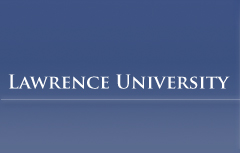Document Type
Press Release
Publication Date
4-20-2011
Abstract
For the second straight year, Lawrence University’s commitment to sustainability has earned it inclusion in “The Princeton Review’s Guide to 311 Green Colleges.”
The guidebook, released Wednesday, April 20, recognizes 308 U.S. and three Canadian colleges and universities that have demonstrated exemplary efforts toward environmental responsibility.
Developed with the U.S. Green Building Council, the second edition of the 220-page guidebook highlights colleges that have demonstrated an above average commitment to sustainability in terms of campus infrastructure, activities and initiatives.
The guide profiles the nation’s most environmentally responsible campuses, spotlighting each institution’s ecological commitment based on several criteria, including building certification using the USGBC’s LEED certification program, use of renewable energy resources, formal sustainability committees and recycling and conservation programs.
Lawrence was cited for its Green Roots environmental initiative, which promotes environmental awareness on the campus and the Committee on Environmental Responsibility, which facilitates dialogue among students, faculty, administrators and community members about the direction Lawrence should take on its path to sustainability.
Other factors include the Warch Campus Center’s LEED Gold certification by the USGBC, the student-run sustainable garden that provides fresh produce to the dining hall, the composting of all food prep waste and the college’s vibrant environmental studies program which draws faculty from 11 different departments and focuses on research projects that lead to solutions for real world environmental problems.
The guide also cited Lawrence students for developing position papers for the Sierra Club, conducting amphibian, bird and water quality surveys for Menasha’s Heckrodt Wetland Preserve and working at New London’s Wind River Bird Rehabilitation Center.
Most recently, Lawrence finished 10th nationally among 363 colleges — and first among 15 Wisconsin colleges — in the 2011 Recyclemania competition’s per capita recycling category (39.15 lbs/person).
“We continue to make great strides on the sustainability front,” said Jeff Clark, associate professor of geology and faculty associate to the president for the Green Roots initiative. “We’ve conducted a waste audit for campus, have acquired state and utility funding for a windmill at Bjorklunden and have moved to using 100 percent recycled paper across campus. That our efforts are being noticed off campus motivates us to continue to move forward.”
According to a 2011 The Princeton Review study, 69 percent of 8,200 surveyed college applicants said information about a school’s commitment to the environment would influence their decision to apply to or attend the school.
“College-bound students are increasingly interested in sustainability issues,” said Robert Franek, The Princeton Review’s senior vice president for publishing. “To that end, we highly recommend the terrific schools in this book.”
The schools selected for the 2011 guidebook were based on a 50-question survey conducted in 2010 of more than 700 colleges across the U.S. and in Canada used to tally “Green Rating” scores scaled from 60 to 99. The 311 schools profiled received scores of 80 or above in that assessment.
Recommended Citation
Lawrence University, "Lawrence University Named one of Nation’s “Greenest” Colleges" (2011). Press Releases. 459.
https://lux.lawrence.edu/pressreleases/459
